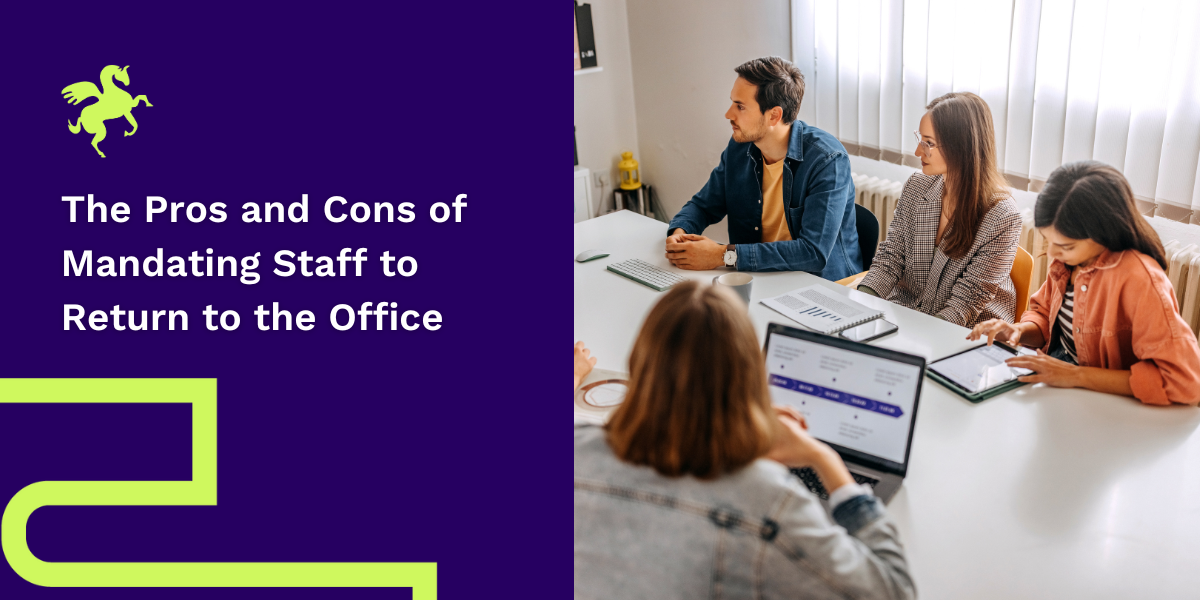
The Pros and Cons of Mandating Staff to Return to the Office
In the wake of the global pandemic, businesses around the world faced a seismic shift in their operations, with remote work becoming the new norm almost overnight. Now, as we cautiously step into a post-pandemic world, the question on many hiring managers’ minds is whether to require staff to return to the office full time. While this decision isn’t one-size-fits-all, it’s crucial to weigh the pros and cons carefully to ensure the best outcomes for both employees and the organization.
Pros:
- Enhanced Collaboration and Innovation: One of the primary arguments for bringing employees back to the office full time is the potential for increased collaboration and innovation. Face-to-face interactions can foster spontaneous brainstorming sessions, facilitate quicker decision-making, and promote a stronger sense of camaraderie among team members. For example, the chance encounters in the hallway or at the water cooler can lead to serendipitous moments of creativity that may not occur in a remote setting.
- Cultural Reinforcement: The office environment often serves as the physical manifestation of a company’s culture. By having employees back in the office full time, organizations can reinforce their values, norms, and sense of belonging. This can be especially beneficial for new hires who may struggle to assimilate into the company culture when working remotely. For instance, regular team lunches, in-person meetings, and company events can help foster a sense of community and connection among employees.
- Increased Productivity and Accountability: While remote work offers flexibility, some businesses have found that a full-time office presence can lead to greater productivity and accountability. With the boundaries between work and home life blurred in a remote setup, employees may find it challenging to disconnect from work and maintain a healthy work-life balance. Being in the office can provide a structured environment conducive to focused work and may reduce distractions that come with remote work, such as household chores or family interruptions.
Cons:
- Limited Talent Pool: Requiring employees to return to the office full time may limit access to a diverse talent pool. Many skilled professionals, particularly those with caregiving responsibilities or living in remote areas, may prefer or require the flexibility of remote work. By mandating full-time office attendance, businesses risk excluding these individuals from their hiring pool, potentially missing out on top talent.
- Increased Costs: Maintaining a physical office space comes with significant overhead costs, including rent, utilities, and office supplies. Requiring all employees to work in the office full time can substantially increase these expenses, especially for businesses operating in high-rent areas. Additionally, businesses may need to invest in additional safety measures and sanitation protocols to ensure a safe work environment in light of ongoing public health concerns.
- Decreased Employee Satisfaction and Engagement: For many employees, the flexibility of remote work has become a highly valued perk. Mandating a return to the office full time could lead to decreased employee satisfaction and engagement, particularly among those who have grown accustomed to the benefits of remote work, such as eliminating long commutes, flexible schedules, and a better work-life balance. This, in turn, could negatively impact retention rates and employee morale.
In conclusion, the decision to require staff to return to the office full time is a complex one that requires careful consideration of the unique needs and dynamics of each organization. While there are undeniable benefits to having employees back in the office, such as enhanced collaboration and cultural reinforcement, businesses must also weigh the potential drawbacks, including limited access to talent, increased costs, and decreased employee satisfaction. Ultimately, a hybrid approach that combines the best aspects of remote work with in-person collaboration may offer the most effective solution for fostering a productive and engaged workforce in the post-pandemic era.











